Frederick the Great
Exposé du gouvernement prussien, des principes sur lesquels il roule, avec quelques réflexions politiques
Berlin, 1775-1776[1]
One often encounters people who have no faith in the ability of a small nation to achieve anything worthwhile.[2] Yet one typically does not have the luxury of choice. One may prefer to live in a large and populous country, but in any event one must work with what one has. Furthermore, the fact is that small states can and do on occasion “punch above their weight” and influence the course of history. In support of the proposition that even the smallest of nations may dare to be ambitious, I give a most powerful example: the Kingdom of Prussia.
When Frederick the Great became King of Prussia in 1740, the population of his little north German realm numbered just over 2 million. This was only a third of the population of England, itself a rather small European power, and Frederick’s kingdom did not enjoy the protection of the English Channel. Instead, Prussia, also a land poor in natural resources, was protected solely by the sheer will to organize all of the little state’s means into the mightiest army possible. The gambles were huge, the threats of annihilation repeated, and yet through it all it was little Prussia which emerged victorious. The machine set in march by Frederick would double in population by the conquest of Silesia and, a century later, give Bismarck the means to unite Germany. Thus Prussia shows how a small principality may become the greatest of European powers.
The lessons of Prussian statecraft are then of interest to all those, be they leaders or citizens of nations great or small, who wish to maximize their potential and fulfill a great project. How did Frederick go about building his machine of state? For this, we may turn to the Great King himself, for he was a prolific writer. In the mid-1770s, he wrote a private[3] Report on the Prussian Government, on the Principles on Which It Operates, with some Political Reflections. The work, as so often with Frederick, is of an admirable lucidity and clarity. I will provide an overview of the Report, which apparently has never been published in English, with translations of substantial passages.
Frederick argues for a unitary state in which all the branches of government — military, budgetary, and political (under which he refers exclusively to foreign policy) — are continuously and harmoniously united towards a single goal. For the insecure Prussia of Frederick’s day, that goal was above all maintaining military preparedness and a “rainy day” war-chest, to both guarantee the state’s security and seize any opportunities which, by the vagaries of international politics, should present themselves. Frederick asserts that the prince must himself give the example, carefully monitoring all aspects of his state’s operation and personally ensuring that military merit is honored above money. Good manners must be promoted among the citizens and fertility encouraged. Above all else, one must concentrate one’s efforts on the decisive, always being thrifty, and not wasting resources on side-projects. The bolder one’s enterprises, the greater the gains.
In short, Frederick’s politics are the antithesis to the bourgeois democratic politics we have grown used to in the postwar era. We may say that Western politics have tended to be ever-more obsessed with materialist consumerism (welfare, purchasing power, GDP; and our politicians even fail to deliver these) and egalitarian “victimocracy” (symbolic and real spoils for various aggrieved groups, namely ethnic minorities, sexual minorities, and women). In both cases, individual and sectional interests are taken as the frame reference, rather than the interests of the community as a whole.
Finances: Frugality Above All
Frederick begins: “To have a general idea of this government, one must examine in detail all the government’s branches, and then combine them together.” These branches are finances, the military, and international politics/foreign policy (la politique). Frederick emphasizes the importance of the budget, which he often compares to an organism’s nervous system: “I begin by finances, which are like the sinews of the human body, which move all its members.”[4] Public finances should be as frugal as possible — notwithstanding spending on fortifications, infrastructure, and foreign allies — so as to amass a healthy war chest that can last until peace is signed:
But one must remark that if we draw all extraordinary war funds from the treasury, we will last only four campaigns, which means that by necessity we must take hold of Saxony, husband as best we can the treasury, which must specifically only serve to fill the emptiness of a few provinces invaded by the enemy. Here is the bottom of things, which shows that one must practice the greatest economy to have the last écu[5] in one’s pocket when one negotiates the peace.
Frederick argues that a substantial budget surplus is justified economically because Prussia had a trade surplus twice as big, thus money was still entering circulation. This surplus, which the Germans do seem to have a knack for, was achieved thanks to “establishing many manufactures, and especially with the help of Silesia.” Frederick emphasizes the need for the most careful monitoring of public spending:
This is why one must not lose sight of manufactures: though them, this [trade] balance can still be increased in our current possession by some hundred thousand écus. But what is important above all is to conserve the good order now established in the management of public monies and the supervision of all funds; without which the people pays very much, and the sovereign is robbed.
Thanks to this thriftiness, Prussia then had enough money for four military campaigns and enough grain for three, including purchases from Poland.
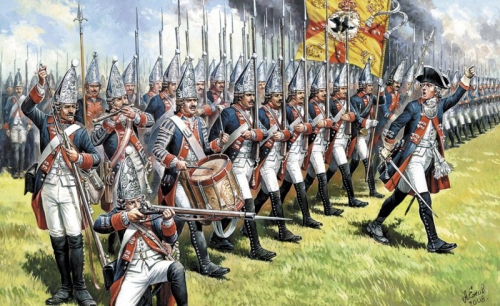
Military Affairs: Preparedness & Honor
Frederick’s description of the Prussian army is worth quoting at length. He argues that Prussia’s militarization is warranted given her insecure geographical position and the size of her neighbors. The Prussian army, based (after the conquest of Silesia) on a country of 5.2 million, was by no means large compared to its neighbors’. Frederick argues then that Prussia can only distinguish itself militarily by the quality and discipline of its armed forces. The commander-in-chief himself must personally give the example “or all is lost” for the little country. Frederick strikes a decidedly conservative note, arguing that if aristocratic officers should prove inadequate, “the recourse to commoners, would be the first step towards the decline and fall of the army.”
ON THE ARMY.
The situation of this State forces us to maintain many troops, because our neighbors are Austria, Russia, France, and Sweden. The war-footing numbers 220,000 men, including the freelance battalions and the increase in cavalry. From this number we will be able to campaign with 180,000 men; but as soon as we need to form three armies, it becomes quite apparent that we do not have many compared to our neighbors. I believe that discipline must remain on the current footing, as must the introduced reforms, unless war should change, because then one may only side with adapting to circumstances and to change with them; but to equal our enemies or surpass them, one needs to do so through order and discipline, to encourage the officers to distinguish themselves, so that a noble emulation encourages them to surpass the enemies they must fight. If the sovereign does not himself get involved in military affairs, if he does not give the example, all is lost. If one prefers courtly layabouts [fainéants de cour] to military affairs, one will see that the entire world will prefer this laziness to the strenuous military profession, and then, instead of our officers being nobles, we will have to have recourse to the commoners, which would be the first step towards the decline [décadence] and fall of the army. We have at present only 70 citizens[6] per company; one must not stray from this principle, to husband the country, which, by the increase in population, will be able to furnish resources or recruits, if war makes it necessary. [. . .] Our population counts 5.2 million souls, of which about 90,000 are soldiers. This proportion may suffice; but one must not take from the cantons more than 840 for each infantry regime and 400 for each cavalry regiment.
Foreign Policy: The Art of Opportunity
Frederick then writes very cogently on foreign policy under the heading “la politique.” This puts the Prussian military theorist Carl von Clausewitz’s later famous definition of war as “politics by other means” in an interesting light. In his great work On War, Clausewitz rarely discusses politics as such but it seems he too supported the primacy of foreign policy, which is to say the overriding interest of the state in maintaining its own existence and security, over liberal and constitutional niceties.[7]
Frederick clearly takes an unsentimental view of international relations as Realpolitik. The goal is to ensure the security of the state, this means: maintaining good relations and an alliance with the state which can most harm us (in this case Russia), acquiring more secure borders (by annexing Saxony as buffer territory), and being ever-prepared so as to be able to seize any unforeseeable opportunities to reach this goal. Frederick emphasizes caution however: given the country’s limited resources, war should only be pursued if there really is something to be gained, one must not overextend one’s territory to indefensible borders, and one must use both modesty and secrecy so as to not disturb the European balance of power and stoke general hostility against us.
ON POLITICS.
One of the first principles of politics is to work to ally oneself with whoever among our neighbors can inflict the most dangerous blows against the State. It is for this reason that we are allied with Russia, because it frees up our back concerning Prussia,[8] and that, as long as this relationship lasts, we have need not fear that Sweden will dare to attack in Pomerania. The times may change, the strangeness of circumstances can force us to take other commitments; but never will we find with the other powers the equivalent of the advantages that we find with Russia. The French troops are worth nothing, and the French are used to only feebly assisting their allies; and the English, made for paying subsidies, sacrifice their allies, to the peace, to favor their own interests. I do not speak of the house of Austria, with which it seems almost impossible to form solid bonds. Concerning the political prospects for acquisitions appropriate for this monarchy, the States of Saxony are indisputably those which would be the most appropriate, by rounding it off and forming a barrier by the mountains which separate Saxony from Bohemia, and which would need to be fortified. It is difficult to foresee how this acquisition could be made. The surest way would be to conquer Bohemia and Moravia, and to trade them for Saxony; or finally that this could be done by other trades either of the Rhenish possessions, adding Juliers or Berg, or by any other way that it could be done. This acquisition is an indispensable necessity to give this State the consistency which it lacks. For, as soon as we are at war, the enemy can march directly to Berlin without finding the slightest opposition on his path. I do not speak of the rights of succession in the countries of Ansbach, Juliers and Berg, and Mecklenburg, because these claims are known, and one must wait for their occurrence. As the State is not rich, we must take care above all else to not get involved in wars where there is nothing to be gained, because one exhausts oneself at a pure loss, and when a good opportunity follows, one cannot take advantage of it. All distant acquisitions are a burden to a State. A village on the border is worth more than a principality 60 leagues away. It is a necessary measure to hide as much as possible these schemes of ambition, and, if one can, to awaken Europe’s envy against other powers, on the occasion of which one strikes one’s blow. This can occur, and the house of Austria, whose ambition goes unconcealed, will needlessly attract the envy and jealousy of the great powers. Secrecy is an essential virtue for politics as well as for the art of war.
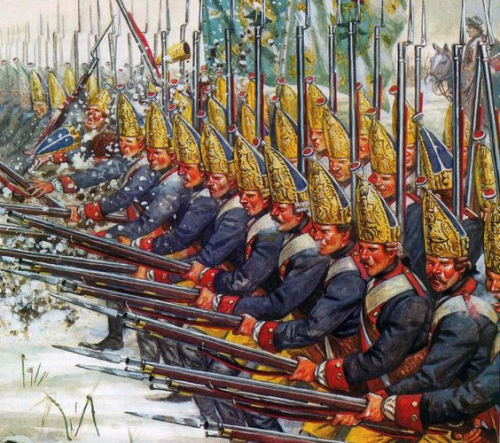 I note with amusement the statements on the value of a Russian alliance, the unreliability of a French guarantee, and the perfidy of Albion, observations which would no doubt resonate with many people in later centuries. Plus ça change !
I note with amusement the statements on the value of a Russian alliance, the unreliability of a French guarantee, and the perfidy of Albion, observations which would no doubt resonate with many people in later centuries. Plus ça change !
Frederick briefly discusses the laws of Prussia [2], describing them as “fairly wisely made.” He argues no changes are needed, but that there must be regular visits to provincial courts to punish malfeasance, for “the parties and the lawyers work to elude the best laws.” There should also be a review every 20 years to ensure the appeals process is not abused through endless trials. These highlight the importance of regular, mindful care for one’s state.
Harmonious Government: All Branches Working Towards the Same Goal
Frederick then discusses finances, the military, and foreign policy as forming the coherent whole which government must be. He again emphasizes frugality and a healthy war chest:
TOTAL COMBINATION OF GOVERNMENT.
Given that the country is poor, and has no resources, it is necessary for the sovereign to always have a well-furnished treasury, to bear at least a few campaigns. The only resources which he may find when in need consist of a loan of 5 million from the Landschaft [a bank decreed by Frederick, made up of noblemen, allowing the state to borrow from the Prussian population itself], and about 4 million which he can draw from the bank; but that is all.
Public money, he says, should be spent on various development projects such as fortresses, manufactures, or infrastructure “in order to make the State’s constitution more solid.”
The sovereign should then be frugal with his subjects’ blood and treasure. He must himself be an example of rectitude, or his subjects will also become wasteful. Frederick emphasizes “especially” the maintenance of good morals, which can only be achieved if the power of money is kept in check. It must be impossible for the wealthy to buy honors, as they do in France. Frederick advocates a muscular natalism in order to produce more citizens and soldiers:
These reasons which I have just put forward demand that this country’s sovereign be economical and a man who maintains the greatest order in his affairs. An equally valid reason as the first is also joined to this: it is that if he gives the example of profusion, his subjects, who are poor, want to imitate him, and ruin themselves. One must especially, to support manners, grant distinctions only according to merit and not for wealth; the poor observation of this principle in France has meant the loss of the of the nation’s manners, which previously knew only the path of honor to achieve glory, and which believes at present that it is enough to be rich to be honored. As the wars are an abyss into which men fall, one must be watchful that this country be as peopled as possible, from which another good results, which is that the countryside is better cultivated and landowners are more at ease.
Frederick denies the utility of a navy for Prussia for this would divide the country’s efforts and anyway be too small to be useful. Instead, one should concentrate one’s efforts on the most decisive point, in this case the army:
I do not believe that this country should ever be persuaded to form a military navy. Here are the reasons. There are in Europe great navies, that is: that of England, those of France, Spain, Denmark, and Russia. Never will we be able to equal them; hence, with a few ships, remaining always inferior to other nations, the expense would be useless. Add to this that, to maintain a fleet, the money this would cost would force us to reform land troops, that this country is not sufficiently populated to provide recruits for the army and sailors for ships, and finally, that sea battles are rarely decisive; from which I conclude that it is better to have the best army in Europe than the worst fleet of the maritime powers.
Frederick argues that policy must “look as far as possible into the future” but recognizes that unforeseen circumstances will always arise. As such, the best one can do is to be ever-prepared so as to be able seize opportunities. Interestingly, Frederick explicitly affirms that political control of the military must serve to radicalize warfare to ensure it reaches the given political objectives: “War itself must be conducted according the principles of policy, to inflict the bloodiest blows against one’s enemies.” Frederick advises great enterprises, even if these are risky, rather than wars for trifling objectives:
Policy must look ahead as far as possible into the future, and judge the circumstances of Europe, either to form alliances, or to counter the projects of one’s enemies. One must not believe that it can bring about events; but when these present themselves, it must seize them to take advantage of them. That is why finances must be in order. It is for this reason that there must be money saved up, so that the government is ready to act as soon as political reasons indicate the moment. War itself must be conducted according the principles of policy, to inflict the bloodiest blows against one’s enemies. It was according to these principles which prince Eugene [of Savoy, an Austrian commander] acted, he who made his name immortal by the march and the battle of Turin, by those of Höchstädt and of Belgrade. These great projects of the campaign do not all succeed; but when they are vast, there always results more advantages than by these little projects where one limits oneself to taking an insignificant town [bicoque] on the border. That is how the count [Maurice] of Saxony [a French commander] gave battle at Rocoux to be able to execute the winter according to his designs upon Brussels, which succeeded.

Frederick stresses that foreign policy, the military, and finances must form a coherent whole. Otherwise they are vain, as in the case of France, which as Europe’s largest state could afford to become flabby and incoherent. Prussia did not have this luxury:
It is obvious that, from all that I have just said, that policy, the military, and finances are branches which are so tightly bound together, that they cannot be separated. One must carry them out all at once, and by their combination, subject to the rules of good policy, there results the greatest advantages for the State. In France, there is a king which manages each branch separately. There is a minister who presides, either to finances, to war, or to foreign affairs. But the rallying point is lacking, and these branches, not being united, diverge, and the ministers are each busy with only the details of their department, without anyone uniting the objects of their works to one fixed goal. If such a thing happened in this State [Prussia], it would be lost, because great monarchies go on despite excesses, and support themselves by their weight and intrinsic strength, and small States are soon crushed, if all in them is not strength, life, and vigor.
Frederick concludes that a small and insecure state such as Prussia must always be led by a watchful prince:
Here are a few reflections and my ideas on the government of this country, which, so long as it has not taken greater consistency and better borders, must be governed by princes who are always watchful, ears pricked, to observe their neighbors, ready to defend themselves from one day to the next against the pernicious projects of their enemies.
Conclusion: Power Through Will
Of Western and European states today, only the United States of America and the Russian Federation can be considered even moderately “big” in a world in which we face China’s 1.4 billion, India’s 1.25 billion, and, in another mode, the endless hordes to come from an Africa destined to number 4 billion this century [3]. Furthermore, any European-American successor states to the current U.S.A. would likely number around 150 million. Frederick’s directives for maximizing the power of small states through a frugal and martial government, characterized above all by a coherent will, are then very relevant to us.
The Greater-European World is made up dozens of states, each of which could, under enlightened leadership, work for the salvation of our people. The means of a small state are necessarily modest, but let no one say that these are worthless. Prussia began as a small enterprise. But by the luck of having successive great princes, a political “germ-cell” was set, the logic of which was favorable to growth, turning a minor principality of 2 million into a Great Power of 5 million, and then into a united Germany preeminent on the Continent, fit for two awesome bids for regional hegemony. The example of Prussia shows that even small states, when armed with unity and will, can maximize their potential and, when the stars align, achieve wonders.
Times have changed since Frederick’s. We, for the most part, do not need to be so mindful of military security as in the past. Indeed, most traditional military conflict in our lands, lamentably, is intra-European. The inherent disorganization of the Third World, nuclear weapons, and the diminishing returns of military occupation in the modern era mean that there are few conventional threats to our security.[9] The Western World’s conflicts with the Arab nations and Iran, far from being motivated by any objective threat, have largely been driven by a hypertrophied U.S. imperial establishment and the malignant influence of the Israel Lobby in Washington, Paris, and London.
The lasting insight in Frederick’s Report on the Prussian Government is the need for a coherent will: that government should concentrate on its core objectives, that all the parts work in harmony towards this, and that this will be steadily maintained over long periods of time. Frederick’s goal was the security of his state and as such he concentrated on maximizing military capability and constant readiness to seize opportunities in foreign affairs. Other objectives may be served by these Prussian virtues: constant mindfulness, frugality, preparation, and setting a good example for one’s citizens.
Frederick emphasizes the importance in politics of encouraging family-formation and maintaining public morals, which is to say shape the society’s culture and enforce positive social norms. The nation and state must always be carefully tended and cultivated that it, like a beautiful garden, flourish and grow. Frederick organized his entire state towards the goal of military power and security. Perhaps we may say that the endangered Europeans of today must similarly organize their states, through systematic cultural and population policies, towards the goals of demographic expansion, genetic quality, and unity within our great family of nations.[10]
Frederick’s patriotic prince can in our times seem something like an alien. We have grown used to living under governments dedicated above all to individual caprice and equalizing victimhood. Our people are so demoralized, that even the idea that our men and women, especially the best of them, should be expected and encouraged to raise children is considered outright offensive by many. Frederick shows that such misguided doctrines do not favor national survival.
We are used to “politics” meaning only more-or-less loathed electoral politicians winning office by publicly pandering to the mob’s bottomless appetite for consumerism and narrow sectional interests, while actually serving the hostile, increasingly post-national oligarchs who finance their political parties and control the mass media who significantly determine the public’s views. In Frederick’s time, the manners of the average citizen, be he farmer, burgher, or nobleman, were shaped by a hard life, national laws, and a state church. Today, besides the general slouching, the education of the youth and the public at large is largely left, to a small, rootless international clique of media moguls, from Carlos Slim and Rupert Murdoch, to Michael Eisner and Sumner Redstone. These men pursue their particular financial, ideological, and ethnic[11] interests, rather than the national good.
This is not inevitable however. At the close of Frederick’s reign, the population of Prussia approached that of England. The two countries in later centuries would enjoy similar rises in power and greatness. We may say that Anglo-America is what northern Europeans tend to when plenty and security afford them the luxury of individualism and egalitarianism. Prussia is what northern Europeans tend to when, driven by poverty and insecurity, they must organize and discipline themselves for collective survival.
The European peoples, we can be sure, will suffer ever-greater insecurity in the twenty-first century with their dwindling numbers, their swamping by outsiders, and the rise of Asia and Africa. By this suffering, the Europeans will painfully learn from their mistakes and again know the true worth of things. No doubt, we will see Prussians again.
In the twentieth century, the logic of Europe and the West had been one of unbridled expansion. From a small appendage of Eurasia, we burst forth and conquered virtually the entire world and multiplied to become a full third of humanity. Since the catastrophic world wars, we have been in headlong decline and, in time, we will have lost not merely our empires, but of even our own historic homelands. By the end of this century, we will be lucky if we still make up 5 percent of humanity. We must arrest our decline by again establishing, by will and discipline, a logic of expansion. The Great King provides us with a powerful model. Every European nation must play its part.

Notes
1. As published in Johann Preuss (ed.), Œuvres de Frédéric le Grand, vol. 9 (Berlin: Royal Printer, 1848), pp. 209-220. http://friedrich.uni-trier.de/fr/oeuvres/9/toc/ [4]
2. On the recurring controversy concerning pan-European political unity: small states’ options and character are indeed, in the long run, generally determined by great geopolitical blocs and empires, often of a continental scale. But it is also true that the larger a polity is, the less cohesive and coherent it is likely to be. In any event, one must not confuse a unitary empire with a multinational and multistatal confederation. The latter is necessarily prone to impotence as each state holds a de facto and/or de jure veto and each nation does not identify with the others. Thus, while a confederation may be a useful thing, one should not place exaggerated hopes in it or believe this to be the critical locus of politics. The locus of politics is always the actual sovereign. Nationalists understand the sovereign acting through the nation-state: mass consciousness is only possible in a nation; political action is only possible through a state. An empire may or may not be preferable, but that is always founded through the spilling of blood, never by signing bits of paper. For the truth of this, I refer you to the history of the United States before Lincoln, of the German Confederation before Bismarck, of Austria-Hungary, Canada, Belgium, and the European Union. (Concerning the latter two, there has been amusing example of paralysis in recent weeks as the region of Wallonia vetoed Belgian support for a major EU-Canada free trade agreement. Thus multinational polities were leading to vetocracy squared: Wallonia vetoed Belgian policy, and Belgium vetoed EU policy. And yet, one finds a thousand people in the political mainstream who believe the permanently paralyzed EU is the primary answer to European decline . . .) I also, again, direct you the very eloquent statements explicating these matters in De Gaulle’s press conferences and Hitler’s Second Book.
3. That it remained unpublished during his lifetime is unsurprising: Frederick is quite frank about his coveting neighboring Saxony in order have more buffer territory on his vulnerable southern border. These ambitions, he insisted, had to remain secret. Prussia would indeed acquire 40 percent of Saxon territory at the Congress of Vienna in 1815.
4. I would add that finance and culture can be said to make up an entire society’s nervous system. Which begs the question: what does it mean if a particular ethnic group, especially if hostile to the majority, achieves commanding influence in a society’s financial and cultural institutions?
In the natural world, the principles and examples [5] from which should always be in our minds, we observe Ophiocordyceps unilateralis, a parasitic fungus able to hijack ants’ behavioural system and turn them into “zombie ants.” According to Wikipedia:
Infected hosts leave their canopy nests and foraging trails for the forest floor, an area with a temperature and humidity suitable for fungal growth; they then use their mandibles to affix themselves to a major vein on the underside of a leaf, where the host remains until its eventual death. The process leading to mortality takes 4–10 days, and includes a reproductive stage where fruiting bodies grow from the ant’s head, rupturing to release the fungus’s spores.
5. An archaic French currency.
6. Presumably Bürger commoners.
7. Certainly, the continued existence of the state is a sine qua non of any policy, but we as nationalists add: policy must serve the existence and cultivation of the people from which the state derives.
8. Here, presumably meaning East Prussia.
9. There are exceptions obviously: Turkey is a threat to Greece, and China is a threat to Russia. In the long term, we also cannot exclude that Africa’s population explosion will eventually form a conventional military threat. What would a Spain reduced to aged pensioners and effeminate young leftists be able to oppose to a few million Islamized Africans led marching upon Europe, no doubt led, according to their genius, by a new Mahdi or General Butt Naked?
10. I observe one prominent “willful state” active in the world today: the Jewish State of Israel. This country has, through a cross-partisan political and social consensus, consistently pursued policies of demographic and territorial expansion, for the security and power of the Jewish people and against the Arabs, whom Orthodox Jewish consider subhuman. The Jews’ fertility rate in Israel is now well above replacement with over 3 children per woman, equaling the Arab rate. (Admittedly, Israel has been successful in large part thanks to its diplomatic and financial parasitism upon the Western nations, to the tune of hundreds of billions of dollars and thousands of European lives, through the tireless efforts of the Jewish-Zionist lobby. But that is but another example successful ethnic activism, only possible because we are not yet ethnically organized.)
11. Unless, obviously, they are of European descent . . .



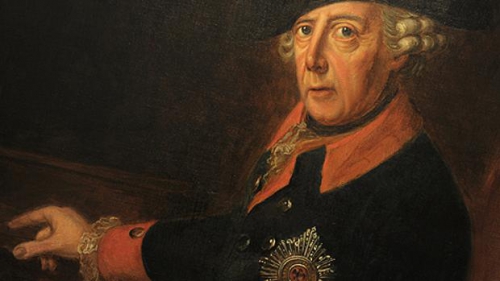

 del.icio.us
del.icio.us
 Digg
Digg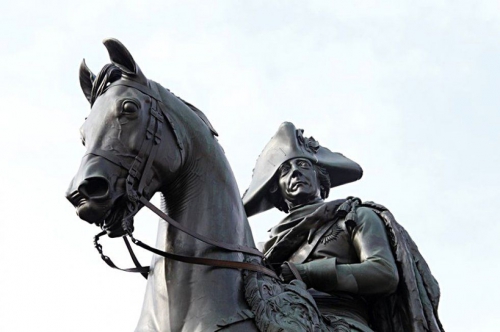
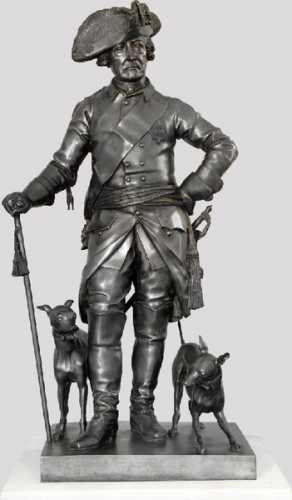 Frederick asserts that laws should aim to promote “[g]ood manners and public safety.” He is enormously concerned with civil peace, saying French chancellor Michel de l’Hôpital’s efforts to increase tolerance and defuse tensions between Catholics and Protestants during the Wars of Religion “worked for the salvation of the fatherland.” Laws may deal with politics (government), manners (criminal), and civil matters (contracts, usury).
Frederick asserts that laws should aim to promote “[g]ood manners and public safety.” He is enormously concerned with civil peace, saying French chancellor Michel de l’Hôpital’s efforts to increase tolerance and defuse tensions between Catholics and Protestants during the Wars of Religion “worked for the salvation of the fatherland.” Laws may deal with politics (government), manners (criminal), and civil matters (contracts, usury).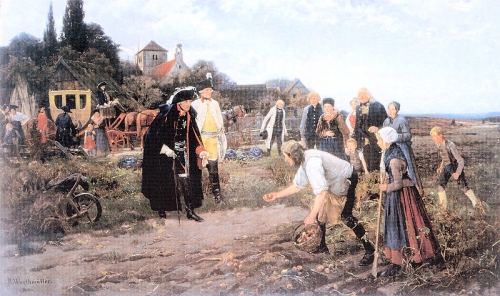
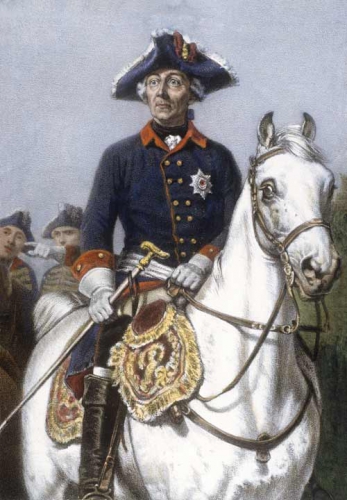 Frederick’s advocacy of paternal authority is all the more poignant and significant in that his own father, Frederick-William, also known as the Soldier King, had been a harsh one. Frederick-William had often beaten his son and executed before Frederick’s eyes his youthful best friend (and possible lover), Hans von Katte, for “desertion.”
Frederick’s advocacy of paternal authority is all the more poignant and significant in that his own father, Frederick-William, also known as the Soldier King, had been a harsh one. Frederick-William had often beaten his son and executed before Frederick’s eyes his youthful best friend (and possible lover), Hans von Katte, for “desertion.”